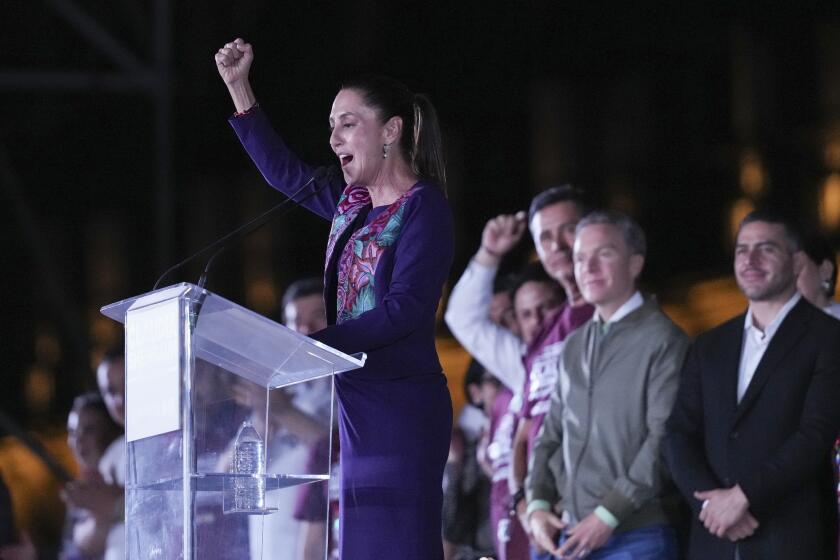Opinion: Nicolás Maduro’s landslide defeat hasn’t dislodged him. Is there still hope for Venezuela?

The Latin American left has a decision to make about Venezuela: Oppose Nicolás Maduro’s totalitarian bid to remain in power indefinitely or enable it. Efforts to constrain Maduro may not succeed. But giving in to him will destabilize neighboring countries — with consequences for the United States — while undermining the left’s claims to respect democracy and possibly costing its leaders political support.
According to an Associated Press review of about 80% of Venezuelan voting machines’ paper tallies provided by the opposition, Maduro lost the July 28 election to opposition coalition candidate Edmundo González Urrutia by a more than 2-to-1 margin. Rather than acknowledge it, however, Maduro simply announced that he had won and blamed an unsubstantiated cyberattack by Elon Musk for his inability to prove it.
Maduro’s blatant steal marks a dark new chapter in Venezuela. Until July 28, the country was authoritarian with a patina of democracy, holding periodic unfree, unfair elections. Now that Maduro knows he lacks the popular support to win even on a tilted playing field, he is scrapping the facade and going full totalitarian, exceeding even his previous crackdowns.
With millions poised to leave if the election doesn’t change the country’s leadership, the repercussions for immigration and the U.S.-Mexico border may be huge.
Maduro’s government has arrested more than 2,000 people without trial since election day; deployed Russian Wagner Group mercenaries, Cuban secret police and other forces; and promised to send critics to “reeducation camps.” At least 24 people have been killed since election day.
Venezuela’s descent into authoritarianism and a coinciding economic collapse in the 2010s pushed about 8 million Venezuelans into exile abroad, more than half a million of whom came to the United States; fueled Colombia’s internal armed conflict by providing rebels with a haven on Venezuelan territory; and polarized Latin American politics into pro- and anti-Venezuela camps.
The lurch toward full-fledged totalitarianism could prove even more destabilizing. Preelection polls suggested about 3.7 million additional people planned to migrate if Maduro remained entrenched. Given Venezuela’s abundance of armed groups and Maduro’s naked lack of legitimacy, it’s not hard to imagine his government losing control as warring forces vie for territory.
The first woman and first Jewish person to lead the country is also a protégé of outgoing President Andrés Manuel López Obrador, known widely as AMLO.
Can anything hold Maduro back? Barring an improbable uprising within his security forces, further mass protests seem unlikely to rein him in. The United States could tighten its sanctions, but Maduro and his inner circle already know how to live under them, having forged ties with other pariah states during their years of isolation dating to the Trump administration.
If anyone outside the country has any leverage, it’s those often seen as Maduro’s friends: the leftist presidents of Brazil, Mexico and Colombia.
These leaders have taken Maduro’s side at times, but Colombia’s Gustavo Petro and Brazil’s Luiz Inácio Lula da Silva have criticized him more recently. They even dissuaded Maduro’s government from disqualifying opposition candidate González — as it had opposition leader María Corina Machado and the first candidate chosen to replace her. Since the election, Mexico’s Andrés Manuel López Obrador has joined Petro and Lula in demanding the release of voting tallies.
The three presidents aren’t pushing Maduro to honor the results and concede outright, which would risk rupturing their ties with Venezuela’s ruling party and upsetting pro-Maduro hard-liners in their own. Given that Maduro threatened to move troops through Brazilian territory to invade Guyana last year, Lula might also fear what he could do if he were even more isolated and vengeful. But the presidents of Brazil and Colombia have said publicly that they are eager to avert mass bloodshed. Brazil is also keen to prevent China and Russia, which quickly recognized Maduro’s “win,” from becoming more involved in the hemisphere and increasing geopolitical tensions, the newspaper O Globo reported.
Given their preference for behind-the-scenes diplomacy — and the risks of burning bridges by publicly slamming Venezuela’s government — if the three leaders are seeking to sway Maduro or his inner circle, it’s happening behind closed doors.
That could produce a range of outcomes. Endorsing another election with a weaker opposition figure on the ballot would amount to propping up Maduro. If the leftist leaders pursue that course or simply do nothing as Maduro’s crackdown proceeds, they will enable another exodus, more economic chaos and further isolation while discrediting themselves.
Pushing Maduro toward a power-sharing deal and giving his opponents control of some government institutions — as the U.S. government envisioned in 2020 — could move Venezuela closer to democracy and increase the opposition’s leverage. The alternative — hoping mass protests push security forces to break with Maduro — looks increasingly unlikely.
Petro, Lula and AMLO don’t have to be idealists to act. They should see the parallels between what’s happening in Venezuela today and the repression the left suffered under their own countries’ authoritarian regimes decades ago. But they also have self-interested reasons to get involved. Many of the voters and allies the leftist leaders need to win elections and implement policy will be alienated if they ignore or embrace Maduro’s totalitarian turn.
Their response will also send an important signal about the health of their own democracies, which are home to nearly 60% of Latin Americans. Colombia’s and Mexico’s presidents are pushing for major institutional changes; Brazil’s president took office only after a failed coup plot. Government critics in all three countries allege, with varying amounts of evidence, that they will roll back democracy or are already doing so. Standing aside as Maduro crushes his opponents would not convince anyone otherwise.
Hopes (including mine) that an overwhelming opposition victory would produce fissures within the Maduro government and enable a transition were not borne out. If there is any hope for such an outcome now, it rests with Venezuela’s neighbors.
Will Freeman is a fellow for Latin America studies at the Council on Foreign Relations.
More to Read
A cure for the common opinion
Get thought-provoking perspectives with our weekly newsletter.
You may occasionally receive promotional content from the Los Angeles Times.












